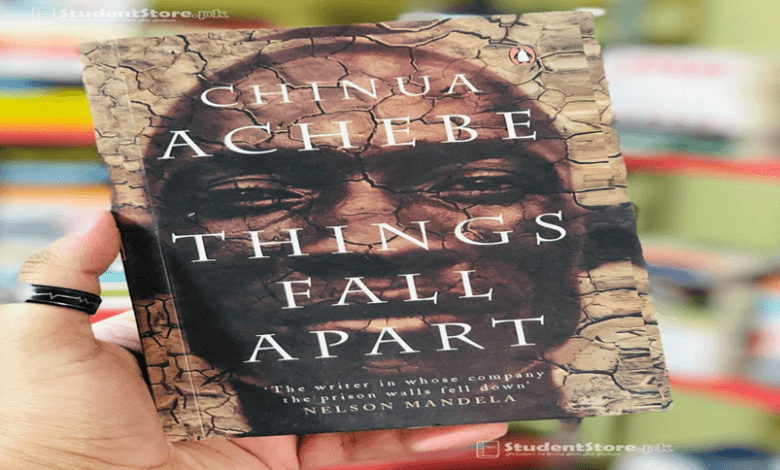
“Things Fall Apart” is a novel by Chinua Achebe, published in 1958. It tells the story of Okonkwo, a warrior and farmer in a fictional village in Nigeria called Umuofia, before and after the arrival of British colonialists in the late 19th century.
Detailed summary of “Things Fall Apart”:
“Things Fall Apart” by Chinua Achebe is divided into three parts.
Things Fall Apart Part 1 Summary:
Part 1 introduces the protagonist, Okonkwo, a respected and influential leader of the Umuofia clan in Nigeria. The novel is set in the late 19th century, during the time of British colonialism, and Okonkwo’s world is shaped by the customs, traditions, and beliefs of his people.
The novel opens with a description of Okonkwo’s family history, including his father’s reputation as a lazy and irresponsible man. Okonkwo is determined to distance himself from his father’s legacy and become a successful and respected member of the clan.
The story then moves on to describe the various ceremonies and rituals of the clan, including wrestling matches, the yam harvest, and religious festivals. Okonkwo is a skilled wrestler and is respected for his strength and bravery.
The novel also introduces some of the key themes that will be explored in the rest of the story, such as the tension between tradition and change, the role of masculinity and femininity in society, and the influence of religion and spirituality.
One of the key events in Part 1 is the arrival of the white missionaries, who begin to spread Christianity and Western education in the area. Okonkwo and other members of the clan are initially dismissive of the white men, but they soon realize that their influence is growing and that their way of life is under threat.
The part ends with Okonkwo accidentally killing a young clansman during a funeral ceremony. This sets in motion a chain of events that will lead to his exile from the clan and the unravelling of his carefully crafted reputation and status.

Things Fall Apart Part 2 Summary:
Part 2 begins with Okonkwo’s exile to his motherland, Mbanta, for accidentally killing a clansman during a funeral ceremony. The people of Mbanta receive him warmly, and his uncle, Uchendu, welcomes him and provides him with a place to stay. Okonkwo is initially despondent and full of anger at his fate, but he eventually starts to adjust to life in Mbanta.
While in Mbanta, Okonkwo learns about the way of life and beliefs of his motherland. He discovers that Mbanta is not as rigid in its beliefs as his own clan, and he is able to connect with his own son, Nwoye, who has converted to Christianity. Okonkwo disapproves of his son’s new religion and tries to bring him back to their traditional beliefs, but Nwoye is not swayed.
Okonkwo also meets Obierika, his best friend, who visits him in Mbanta and brings news from their clan. Obierika tells him about the changes that have taken place in the clan since he left, including the arrival of white missionaries who are spreading Christianity and Western education.
As Okonkwo starts to contemplate his return to his clan, he receives a visit from one of the messengers of the white missionaries who is sent to stop a meeting of the leaders of Mbanta. The messenger is disrespectful to the elders, and Okonkwo kills him in a fit of anger, knowing that this action will lead to war with the white men.
The novel ends with Okonkwo realizing that his actions have sealed his fate, as he has violated the laws of his motherland and the laws of the white men. He knows that he will not be able to escape punishment and will have to face the consequences of his actions.
Things Fall Apart Part 3 Summary
Part 3 begins with Okonkwo’s return to his clan after his exile. He finds that the clan has changed significantly since he left, with the white missionaries and colonial government exerting more and more control over their way of life. The clan is divided between those who want to resist the white men and those who see the benefits of adopting their ways.
Okonkwo is determined to fight against the white men and their influence, but he finds that many of his fellow clansmen are not willing to follow his lead. He becomes increasingly frustrated and disillusioned with his own people, whom he sees as weak and submissive.
The conflict between the white men and the clan comes to a head when a group of Christian converts destroy a sacred shrine. In retaliation, the clan members attack the Christian church and kill one of the white men.
The colonial government responds with force, arresting and imprisoning several clan leaders, including Okonkwo. When Okonkwo is released from prison, he finds that his clan has not risen up against the white men as he had hoped. In despair, he commits suicide, realizing that his way of life and the traditions of his people are doomed.
The novel ends with the arrival of a white colonial administrator, who reflects on the ignorance and barbarism of the people he has come to rule. The novel serves as a critique of the destructive impact of colonialism on African societies and the importance of preserving traditional cultures and beliefs.
Existence Precedes Essence: Embracing Freedom and Responsibility
Major Themes in “Things Fall Apart”:
Things Fall Apart” explores a number of major themes, including:
Colonialism and Cultural Clash:

“Things Fall Apart” portrays the devastating effects of colonialism on traditional African society, particularly on the Igbo people of Nigeria. The novel depicts the clash of cultures between the Igbo people and the European colonizers, who bring with them their own language, religion, and customs.
The novel shows how the arrival of the Europeans leads to the breakdown of the traditional social and political structures of Igbo society. The colonizers impose their own values and beliefs on the Igbo people, leading to the erosion of their cultural traditions and the loss of their sense of identity. The Igbo people are forced to adapt to a new way of life that is alien to them, and this leads to significant disruptions in their society, including conflicts between different groups and individuals.
The novel also portrays the violence and brutality that often accompanied colonialism, including the use of force to impose European values and beliefs on the Igbo people. The arrival of the Europeans also leads to the destruction of the Igbo people’s spiritual beliefs and practices, as well as their social and economic systems.
Overall, “Things Fall Apart” shows how colonialism leads to the destruction of traditional African culture and the imposition of a new, foreign way of life on the people who live there. The novel is a powerful critique of colonialism and its devastating impact on African societies.
Either the money can buy happiness or money can’t buy happiness is true
Tradition and Change:
“Things Fall Apart” also deals with the tension between tradition and change, as the characters navigate the shifting landscape of their society. The novel portrays a society that is deeply rooted in tradition, with customs, beliefs, and practices that have been passed down from generation to generation.
However, the arrival of the Europeans and the forces of colonialism bring significant changes to this traditional way of life. The characters in the novel are forced to confront this tension between tradition and change, as they struggle to adapt to the new circumstances and find a way to preserve their cultural identity in the face of external pressures.
Okonkwo, the novel’s protagonist, is a prime example of this struggle between tradition and change. He is deeply committed to the traditional values and customs of his society, and he views any deviation from these norms as a sign of weakness or cowardice. However, he is also aware of the changing world around him, and he fears that these changes will undermine the traditional way of life that he holds dear.
The novel portrays the tension between tradition and change as a complex and multifaceted issue, with no easy solutions. It suggests that while it is important to preserve cultural traditions and values, it is also necessary to adapt to changing circumstances and find ways to reconcile tradition with new ideas and practices. Overall, “Things Fall Apart” highlights the importance of finding a balance between tradition and change in order to ensure the continued survival and vitality of a culture.
Masculinity and Gender Roles:

“Things Fall Apart” portrays a society that is deeply patriarchal, with men holding all the positions of power and women being relegated to a subordinate role. Women are expected to be obedient to their husbands and to perform domestic tasks such as cooking, cleaning, and caring for children.
The novel explores the ways in which this system of gender roles affects the characters, particularly Okonkwo, who is a highly respected and successful member of his community. Okonkwo places great value on masculinity and views any behaviour that he perceives as weak or effeminate as a sign of weakness. He is highly critical of his own son, Nwoye, who he perceives as being too feminine and not living up to the expectations of traditional masculinity.
The novel also portrays the ways in which women are marginalized and oppressed within this patriarchal system. Women have little say in the decision-making process of the community, and they are often treated as property to be bought and sold by men. The novel portrays the struggles of women to assert themselves within this oppressive system and to find ways to resist and challenge the patriarchal norms that govern their lives.
Overall, “Things Fall Apart” is a critique of the patriarchal system that governs traditional African societies, and it highlights the ways in which gender roles and expectations can have a profound impact on individuals and communities. The novel suggests that true equality and liberation can only be achieved by challenging and dismantling these oppressive systems of power and privilege.
Fate and Free Will:

“Things Fall Apart” also explores the theme of fate and free will, particularly through the character of Okonkwo. Okonkwo is determined to overcome the fate of his father, who was a lazy and unsuccessful man, and to become a successful and respected member of his community. He believes that he has the power to shape his own destiny through his hard work, determination, and willpower.
However, the novel also suggests that there are certain forces beyond our control that can influence the course of our lives. For example, Okonkwo’s exile from his village is not entirely of his own making, but rather the result of circumstances beyond his control, such as the arrival of the Europeans and the changes that they bring to the society.
The novel suggests that while we have some degree of control over our own destinies, there are also larger forces at work that can influence the course of our lives. It raises questions about the extent to which we are truly free to shape our own destinies, and whether fate plays a role in determining the course of our lives.
Overall, “Things Fall Apart” explores the complex relationship between fate and free will, and suggests that while we have some agency in shaping our own destinies, there are also larger forces at work that can influence the course of our lives. The novel raises important questions about the nature of human agency and the extent to which we are able to control our own lives.
How to Find the Real Purpose of Life?
Language and Communication:
“Things Fall Apart” also explores the theme of language and communication, particularly through the interactions between the African characters and the European colonizers.
The novel demonstrates the power of language to shape our beliefs and our sense of self. For example, the African characters in the novel have their own language, which is intimately tied to their culture and their way of life. They use language to tell stories, to express emotions, and to convey important cultural values and traditions.
However, the arrival of the Europeans brings a new language and a new way of communicating. This language is used to spread new ideas and values, and to justify the actions of the colonizers. The novel shows how the imposition of a new language can have a profound impact on a culture and can be used as a tool of domination and control.
The novel also demonstrates the potential for misunderstanding and miscommunication to cause conflict and violence. For example, the misinterpretation of a proverb leads to a violent confrontation between Okonkwo and another man in his village. Similarly, the failure of the European colonizers to understand the culture and traditions of the African people leads to conflict and violence between the two groups.
Overall, “Things Fall Apart” explores the complex relationship between language and communication, and highlights the potential for language to be used as a tool of domination and control. The novel also raises important questions about the importance of understanding and respecting different languages and cultures, and the potential for misunderstandings and miscommunications to lead to conflict and violence.



